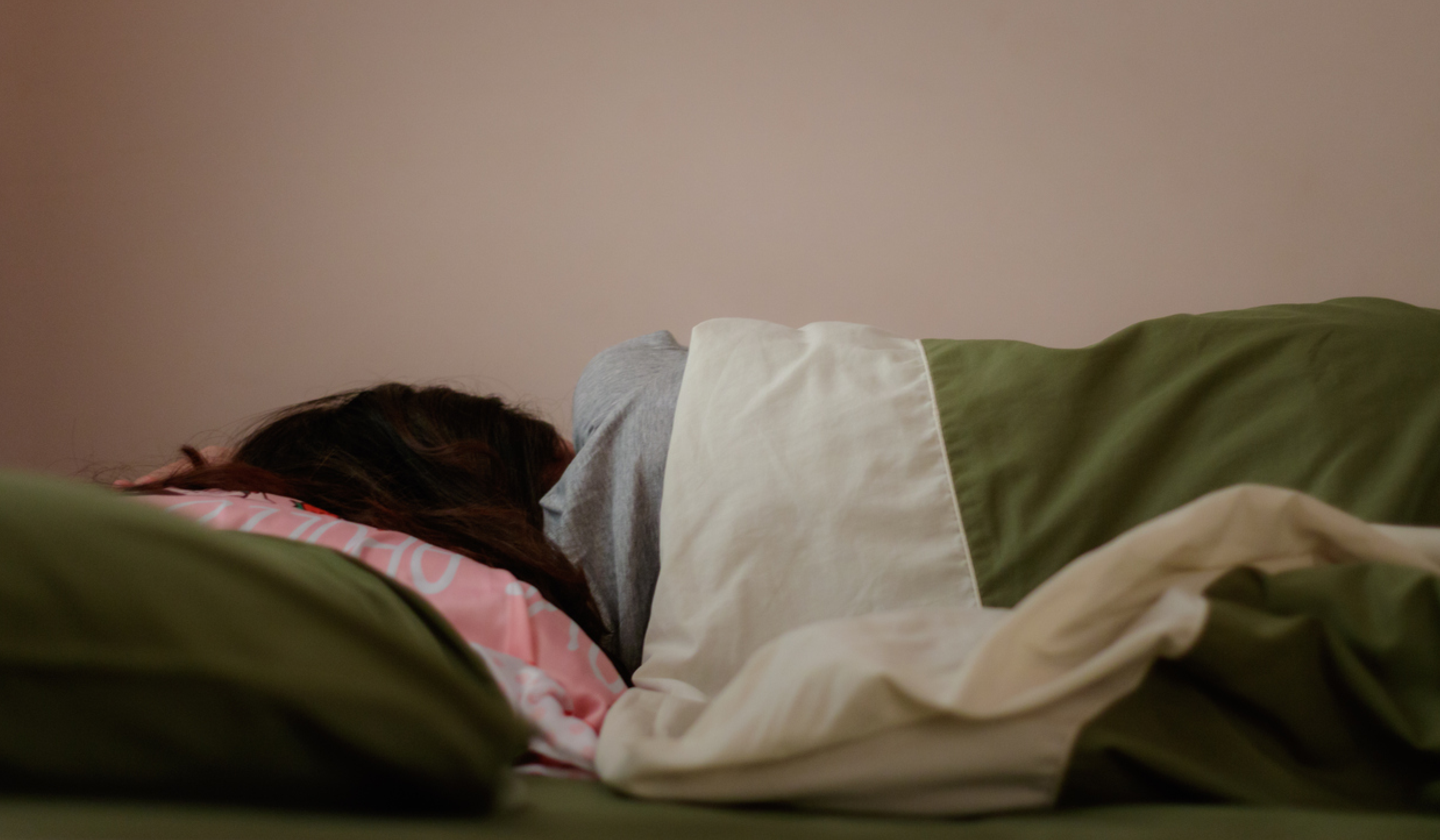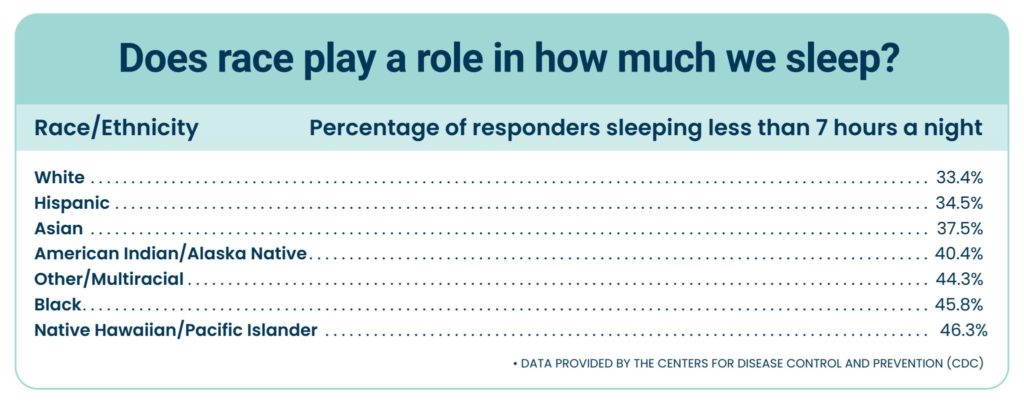A Look at Sleep Inequality in America

Income inequality. Social inequality. And now, research suggests, there’s rampant sleep inequality in the United States. Although the widespread physiological benefits of sleep are well documented, recent findings show that not everyone has equal access to sleep attainment.
Until recently, public health research on sleep problems across the population looked at sleep through too wide of a lens – clumping all races, ethnic groups, and socioeconomic factors into one bucket. This obscured how the burden of sleep deficiencies are unequally distributed across society.
When we take a closer look, recent research by the CDC shines a glaring light on what some are calling a sleep inequality epidemic: wealthy white Americans sleep significantly better than poorer Americans of any other race.
Keep reading as we review the widespread burden of sleep inequality in America – from its impact on sleep disorders, sleep quality and sleep architecture, to how socioeconomic factors such as poverty, housing, and even discrimination can widen the divide.
Racial and Ethnic Disparities In Sleep Across the United States
Let’s first explore racial inequality and sleep in the United States. In 2014, the CDC conducted a large-scale survey on nearly 450,000 adults. The purpose of this survey, known as the Behavioral Risk Factor Surveillance System, was to provide data essential for monitoring health throughout the nation. At first glance, the preliminary findings were troubling.
Over a third of white Americans fail to get the recommended amount of at least 7 hours of sleep per night. And although this figure appears high, the number actually balloons when we look at every single other race.
As shown in the table below, Black Americans, Native Hawaiian/Pacific Islander, and multiracial Americans are most severely affected by a lack of sleep, with nearly 50% of each reportedly sleeping less than 7 hours a night.

And while research by the CDC was based purely on self-report telephone interviews, researchers have also found that these findings mirror objective measures of sleep (which are potentially more reliable than self-report measures).
In one study, Black, Hispanic/Latino, and Chinese participants slept up to 1 hour less than White adults. In addition to sleeping less, the quality of the already insufficient sleep was poor. Black adults were 57% more likely to have poor sleep quality, and up to 90% more likely to have excessive daytime sleepiness.
Some studies also suggest that some Black Americans may experience too much sleep – a potential sign of some underlying illness. However, this finding may also reflect the body compensating for unusual sleep architecture, or the time spent in various sleep stages throughout the night. Black Americans often experience less slow-wave sleep (sometimes referred to as deep sleep) compared to White Americans. In fact, studies show that they experience approximately 5% less deep sleep and significantly more light sleep.
With insufficient deep, slow wave sleep, the body may compensate by sleeping for extended periods of time. Similar to short sleep, excessively long sleep (often characterized by greater than 9 hours of sleep per night) has been associated with a myriad of health concerns, although more research is needed to understand exactly why this is the case.
The Association Between Poor Sleep and Health
Nonetheless, excessively long sleep duration coupled with insufficient slow-wave sleep can be a recipe for disaster for conditions like type-2 diabetes. A lack of slow-wave sleep negatively impacts the body’s ability to properly metabolize glucose and is associated with increased insulin resistance. In turn, these processes can predispose poor sleepers to obesity and diabetes – diseases already disproportionately affecting Black and Hispanic/Latino Americans.
As if this were not already enough, Black Americans are also twice as likely to suffer from severe obstructive sleep apnea (OSA). OSA is a potentially dangerous sleep disorder in which breathing involuntarily stops for periods during the night resulting in poor sleep quality, excessive daytime sleepiness, and an increased risk in several chronic health conditions. Black American children are especially vulnerable to the risk of OSA, with some research suggesting that Black children are 4-6 times more likely to suffer from OSA compared to White children.
Racial And Ethnic Sleep Disparities Begin Early in Childhood
Unfortunately, these sleep problems appear to begin early in life for most racial and ethnic minority children and adolescents. A recent meta-analysis examining the results from over 20 independent studies found that White American youth generally had more sufficient sleep than other minority youths. In fact, nearly all studies included in the analysis showed racial disparities in sleep duration, sleep quality, and bedtime/wake time in school-aged children.
Clearly, the sheer rate of racial and ethnic sleep disparities is striking. However, there are additional concerns about the cascading effects of insufficient sleep that may impact the physiological development and academic success of minority youth. For example, optimal sleep efficiency – a ratio of time spent in bed to the total time spent asleep – has been shown to be strongly associated with math and language grades in children. On the other hand, adolescents who obtain even 1 hour less sleep than the recommended average have been shown to have an increased risk of obesity.
These findings highlight one of the many reasons why increasing the number of children – particularly among minorities – who get sufficient sleep was recently included as a core objective for Healthy People 2030.
What’s Contributing to Sleep Inequality in America?
Sleep inequality is a widespread and even cyclical problem in America. There are pre-existing racial and ethnic disparities in sleep that appear to begin in early childhood, and this poor sleep can exacerbate overall health and wellness. Racial and ethnic minorities in American must also juggle an already complex set of societal disadvantages, making obtaining time for sufficient, undisturbed sleep more difficult. Although there is no one single explanation for the potential causes of America’s sleep gap, socioeconomic factors may play a significant – and often debilitating – role.
Sleep Inequality and Indicators of Poverty
Several studies have examined how certain indicators of poverty may be associated with sleep issues. For example, a 2013 survey of over 4,000 participants found that taking too long to fall asleep (> 30 minutes) was associated with lower education, no private health insurance, and food insecurity. Difficulties with falling asleep, maintaining sleep, early morning awakenings, and non-restorative sleep were also associated with food insecurity. Snoring was also more common among Hispanic Latinos, those less educated, and individuals reporting food insecurity.
The likelihood of poor sleep also increases with greater poverty. One study assessing objectively measured sleep found that people with less income took significantly longer to fall asleep and had worse sleep efficiency. According to the CDC, nearly 35% of individuals living in households below the poverty threshold reported sleeping less than 6 hours a night, relative to just 25% of those living 4x above it. Unsurprisingly, those unable to work or unemployed also commonly report issues with sleeping enough and taking too long to fall asleep. And as non-white Americans suffer from an increase in discrimination, the likelihood of finding better jobs and housing also declines.
Sleep Inequality and The Home Environment
Suboptimal sleep environments can have a devastating impact on sleep due to light pollution, air pollution, and excessively loud noises. For example, a 2018 study found that adolescents living in poorer socioemotional conditions experienced significantly worse sleep duration and sleep regularity during the week. Fascinatingly, even a minimal improvement in housing can have a profoundly positive impact on sleep. Argentinian slum-dwellers who transitioned from a low-quality home to a basic prefabricated 18 m2 modular home showed significant improvements in sleep quality, physical and mental health, and overall quality of life.
Sleep Inequality and Mental Health
The consequences of socioeconomic instability also have detrimental effects on mental health, particularly stress, anxiety, and depression. Unfortunately, stress and anxiety are sleep’s worst nightmare – and the relationship is often cyclical. Overactivation of the sympathetic nervous system and increases in blood pressure resulting from anxiety and stress can increase levels of cortisol making it more difficult to fall and stay asleep. Several studies have even found an association between discrimination and sleep problems. Black Americans reporting high rates of discrimination not only had less deep sleep, but also significant elevations in blood pressure. Similarly, Hispanic/Latino Americans experiencing acculturation stress were more likely to experience symptoms of insomnia. Imagine chronically worrying about being able to pay for rent, afford groceries, or even making it home safely. It’s no wonder Americans in low-income households have significantly higher rates of mental health issues, yet often have fewer resources and education on how to manage their psychological health.
The Sleep Inequality Epidemic
Where do we go from here? Although the solution is likely as complex as the problem – and outside the scope of this article – we can begin by addressing the problem for what it undoubtedly is: a sleep inequality epidemic that warrants the attention of multidisciplinary sectors including health professionals, scientific researchers, and governmental agencies.
Fortunately, improving sleep may offer clinicians and scientists a way to attack intractable health conditions that often disproportionately impact ethnic and racial minorities in America.
SleepScore Labs Solutions
Download the free SleepScore App for insights and articles on how well you sleep, the quality and quantity of your sleep cycles, and sleep improvement progress with science-backed tips and insights. Download it for free from App Store and Google Play Store!
You can also visit the SleepScore Store for a wide range of sleep-promoting products carefully curated by SleepScore Labs’ team of researchers to support your sleep-wake schedule!
Sleep well!